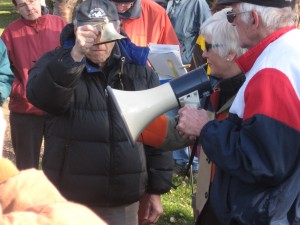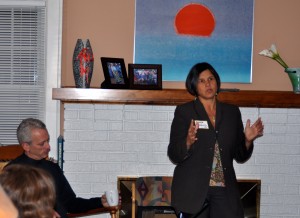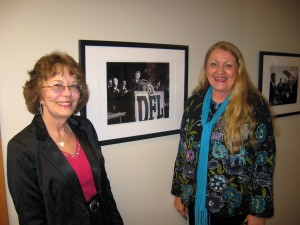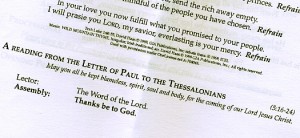UPDATE November 4, 2011: All comments are accessible in the November 3 post, accessible here Further comments will be added to this post if/as they are received. Check back from time to time.
PRE-NOTE: Heritage #1-4 begin October 5. What motivates this rather long column on religion and the politics connected with it is a sermon given by a prominent Congregational Pastor who is a good friend and colleague of the highly respected Catholic Priest who married my wife and I. The sermon was forwarded to me by another friend who is Jewish. The sermon is worth the time to read. It is not the topic of the following, but its contents directly relate.
Comments about this post are welcome, and will be added to the end if received by e-mail. There is one comment already. Check back once in awhile if interested in future comments (if any).
This is my turn to talk about an often confusing issue: my Catholic Church. The opinions expressed are my own. The Catholic Church is a very large organization dominated and run by a very small group of men with a political structure designed to perpetuate a certain point of view, and it is not comfortable for even an active layperson like myself to express a contrary opinion. But there is a time, and the time is now.
Nestled at page A14 of Sunday’s Minneapolis Star Tribune, the only article on the page, was this item from the Washington Post: “FOR CATHOLICS, A REVISED MASS“.
The news in the Star Tribune article was not a surprise. We Catholics have been hearing about its coming for a year. The new words arrive officially on Advent, the beginning of the new Church year.
For some Catholics these new words may be a joyous development, for others (me included) they are unnecessary, ill-advised, divisive and they are a sign of an irreversible mandate of current church leadership to go backward as much as possible to the old days before Vatican II (early 1960s).
For most people who are counted as Catholics the language change will be meaningless. Rather than a sign of unity, the new imposed language is a sign of further division within the Catholic Church, and in my opinion no encouragement for ecumenism, even within the Catholic community itself.
I am a lifelong Catholic and an active one. Three times this past month I’ve ushered at the Basilica of St. Mary, the pro-Cathedral of the St. Paul Archdiocese. I rarely miss Sunday Mass. In fact, I like going to Mass. It ends and begins my week, every week. The new text will not change my habit or tradition. We receive the Archdiocesan newspaper, and I particularly read the Archbishops opinions. I’m pretty well informed.

1914 Postcard of the envisioned (then under construction) Basilica of St. Mary Minneapolis
I’ll live out my life as a Catholic, but this is not to say there is only a single definition of what a “Catholic” is. Ask any Catholic who cares, and you can get an opinion, by no means all the same.
All is not quiet within the walls of Catholicism.
The Old Days
I grew up in what I have always called “Catholic Catholic” families from rural midwest communities. Catholicism was central to their lives, both on the German and French-Canadian sides, going way back. My parents, born in the first decade of the 20th century, carried the tradition forward and were devout Catholics. Had Dad been able to master Latin, I likely wouldn’t exist. He wanted to be a Priest like his fellow Altarboy, Ed McDonald, who later became a Priest, later a Monsignor, and in 1937 “Father Ed” married Mom and Dad, Henry and Esther. Priests and Nuns came from my root families. In many ways, I am my father’s son (Henry Bernard, R.I.P. Nov. 7, 1997)
Those were the good old days when the language of the Mass was Latin, and the only way to follow along was a bilingual Missal: English (or German, or…) on one side, Latin on the other.
The Priest was an authority figure – “Father” – separate from and superior to the faithful.
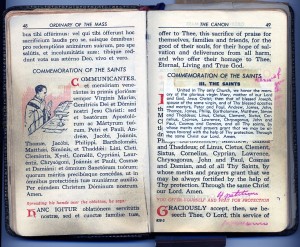
Page of Henry Bernard's well used St. Joseph Missal, a gift he received in 1956
The people were essential to the Church but subordinate.
Grandma Bernard’s 1906 edition of Douay-Reims (Catholic) Bible had the below clear warning in its Preface. I’ve often wondered if Grandma, with a 6th Grade Education, ever read that Preface, or cared what it said (click to enlarge).
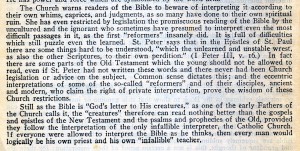
1906 Douay-Rheims Bible, imprimatur His Eminence John Cardinal Farley, The E.M. Lohmann Co St. Paul MN
Back then, Church boundaries were sacrosanct: if you lived within a churches neighborhood, that was the church you attended. This was easy to enforce as people had less mobility than today. Each year parishioners financial giving was published. It was always interesting to read who gave, and how much.
Ecumenism (simply getting along with other denominations) was frowned upon. There was suspicion and distrust, one denomination to another. Pre-Vatican II, I would not have seen a Congregational ministers sermon sent to me by a Jew. For a time in the 1920s, a main target of the Ku Klux Klan was Catholics. Where dominant, Catholics were not kind to Protestants or Jews.
Most marriages, at least within religions, were within a specific culture: i.e. French-Canadian Catholic married French-Canadian Catholic. Interdenominational marriage did not happen inside a church, at least not in a Catholic Church.
Change to the new.
October 1962 to December 1965, now nearing 50 years in the past, was the Second Vatican Council, a time of change, . When Vatican II began I had already graduated from college, and was in the Army. Pope John XXIII (Pope 1958-63) had figuratively opened the church windows to change many Catholic practices in many ways. While I don’t know this for sure, I think the same dynamic was happening within other denominations.
Ecumenism flourished. We learned that Methodists were okay, and they got to know Catholics as real people, not as agents of a foreign power, the Vatican.
Most of us now living have spent more than half our lives in Post-Vatican II.
The present.
I’ve observed in my many years around the church that it is at minimum two separate “Catholic” churches.
There is the official business entity, the hierarchy, the Bishops and on up the line to the Vatican. Our local Archbishop defined the Catholic Church power structure very well in his column in the Diocesan newspaper June 9, 2011: “The Minnesota Catholic Conference [is] made up of the seven Catholic bishops from the state”. The Bishops, not the people, are the official voice of the Church. They keep their own counsel, consistent with Rome; they are not selected by the approximately one million people they are said to represent, nor are they under any obligation to seek input or listen to that input from the parishioners. This is the Church which owns the property. If there is a “Catholic” position, the Bishops are the ones who speak it. It is just how it is. They are the language of power. They are heavily involved in political issues – all legal, of course.
The other Catholic Church is the people I see in the pews every Sunday, and those in other pews in other Catholic Churches. These garden variety Catholics are a diverse lot, not easy to typecast. Some of these like an authoritarian Church.
But few of us are in the pews.
In a revealing document I saw and kept in June, 2009, an official Archdiocesan planning committee said that only “34% of registered Catholics” attend Mass on Saturday evening or Sunday, and that “this Archdiocese is aligned with the national estimate.”
Succinctly, apparently two-thirds of
registered “Catholics” don’t go to Church, at least not on a regular basis.
Other non-participants may represent a third Catholic Church: ask them, and they will say they were raised Catholic, or baptized, but that is about it.
To be Catholic is to not fit into a particular niche.
I think non-Catholics find Catholicism puzzling, and I think a large part of this comes from the tension between the officialdom at the top, and the rest of us. Another reason is that the Church is not an open book: there is always an intended and strong element of mystery to it, and not in the sacramental sense. It’s “none of your business”.
There are endless tensions these days, and they are conveyed sometimes not too subtly in sermons and bulletin commentary. On Sunday we were informed that our Church was significantly short in its budget, and there was an urgent appeal to help cover the shortfall. Absent adequate money, programs begin to suffer. Giving is voluntary, of course, and at least one reason might be one or another areas of disagreement with something the Church (not necessarily the Parish or the Priest) has done.
Perhaps we’ll write an additional check, but part of me resists….
The Priests – what is left of them, and they are a dying breed – are caught in the middle of all of this, and do not all think alike. They are not free agents. They are representatives of the hierarchy – the Church. But they are not all cut from the same ideological cloth. As is true of their parishioners, they have their own points of view.
At our church, we often see visiting Priests, as retired Priests, Professors, Monks and the like. Succinctly, there are few Priests to go around, even for very large congregations such as ours. I do listen very carefully to sermons from the Priests as they interpret the text of the day.
Many of these clerics are brilliant people. My guess is that some of their messages rankle the authoritarians in the pews.
Nuns? These were the true sheroes (not misspelled) of justice and peace, the essence of the Catholicism I love: hospitals, schools, etc. I was proud to
know a number of them quite well. Today, Nuns exist, but barely. Years ago they were a cheap and exploited “human resource” but vocations are few and far between these days.
Future
The Catholic Church will not disappear. It is far too large and it has been around too long. On the other hand, we are a pluralistic country, of many beliefs and traditions. No one of these can or should dominate.
I think that my Church is in for ever rougher times as the authoritarian fringe attempts to reestablish control and bring back the “good old days”.
The new Mass text will come – that is a given. Missal publishers will make a mint on the new business, though I doubt there will be a huge market for the Missals – that would happen only if they went back to Latin. The new text will not help bring unity, and I think the hierarchy knows this: thus the long roll-out process.
One could laugh, back in the 1950s, about the fear of the “Pope’s Army” preparing to take over. I used to envision church ladies with machine-guns in Church basements. For me, it isn’t such a laughing matter any more. There is an “Army” and it is being used. Only the weapons are different. I do see a growing abuse of power originating in Rome.
The Church, with all its many faults, has done immense good through history (think Catholic Charities, Catholic Hospitals and the like.) The true core of the Catholic tradition, the essence of the Christian scripture, is peace and justice.
But the current dominant and authoritarian leadership is not well serving the Catholic Church.
Can the Church recover the glory of the old days? I don’t see such a scenario. I’m told the all-Catholic Quebec of my ancestors is full of beautiful and almost empty churches today. Some years ago I heard that Rome itself is considered mission territory by the Vatican.
Will the new changes make a positive difference overall? I have my doubts.
END NOTE: I belong to a very large Church prominent among the Catholic Churches in this area. Big prominent places like my Church tend to get favored treatment.
It is further down the line – the smaller rural parishes – where the tensions and disproportion of power between laity and hierarchy become more visible and the issues more urgent.
Earlier this month I was at a vibrant rural, now suburban, parish in another state. The church was packed for the weekend Mass. At the back of the church was a handout prepared by the pastor. That handout is here, with identifying information redacted.
Church Decision001 It is not necessary to read between the lines. Succinctly, what the Parish could accomplish and wanted was subordinate to the Bishop’s wishes.
UPDATE:
My good friend, Jeff, spent most of his life as a practicing Catholic until his particular last straw several years ago. Here’s his comment:
A good discourse my friend. Well undertaken and drawn.
I also think much good has been done over the centuries by Catholic entities, you mentioned a few.
However , as a historian, I would say the evidence in respect to the presence and influence of the Catholic church falls heavily on the authoritarian side. (I don’t need to cite the terrible history of the Inquisition, going hand in hand with imperialism and colonialism, the sad record of the leadership in WWII (not to denigrate the very many Catholic priests and nuns who were on the right side), right up to the record of the current leadership which is well fleshed out by your article)
Dorothy Day, Catholic support for the Labor movement, the liberation theologies and movements in 1960-1990 Latin America, the peace and justice movement are really relatively minor compared to the historical record of the institutional church and its authoritarian history commingled with Spanish/Portuguese imperialism, Catholic anti democratic alignments generally in Europe from before the Reformation to the 21st century. In general the Church aligned itself against the forces of reform, Enlightenment and democratic self determination nearly every step of the way. And generally the most Catholic countries became both democratic and economic backwaters with few exceptions, France being one, but I suspect you know the history of Modern France since the Revolution was one in which the prerogatives of the Catholic church and clergy were really stopped in a hard way by the French govt/people for the most part — I would not say the record is 100% one sided, but lets say it is certainly heavy to one side.
So your comment is very well drawn, but I would say that the period of Vatican II which essentially lasted into the late 80’s was a minor aberration.
I respect your fight. Keep it up, I still read the weekly archdiocesan paper with a lot of empathy for the faithful, and with incredulous disdain for the official propaganda espoused there.
Final note: Ethnic Catholicism in America is a good topic… historical Irish and German Catholicism being quite a bit different than Italian and French Catholicism. And of course there is Polish Catholicism and now Hispanic Catholicism… and even African Catholicism , or Asian (Vietnamese and Filipino and Indian) Catholicism….
A diverse and un-stereotypical bunch.. indeed.
Also I would say that many Catholic clergy and laypeople obviously over the centuries were on the anti authoritarian side. (the Spanish Civil war was a good example, however its typical that again the Catholic church was for the most part aligned with Franco, even though there were some courageous dissidents on the other side) Also the Church does have a tendency like American political parties, to go thru periods of internal disequilibrium followed by dissent, co-opting the dissent and finally reform within the institutions…. Certainly that was true in the case of the Pre Reformation church in light of the Cluniac reforms, Franciscan movement, and the ability of Thomas Aquinas to bring the rational thought of Aristotle into the Church and Western culture, and even some of the Counter Reformation (which had some merits, but was a bit more like the movement you are seeing now… lol)
UPDATE November 4, 2011: All comments are accessible
here.


